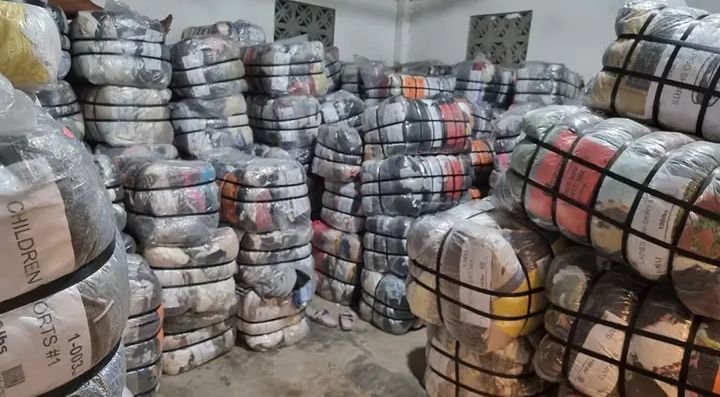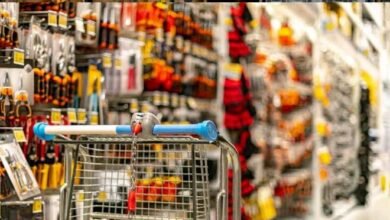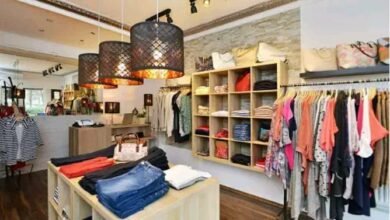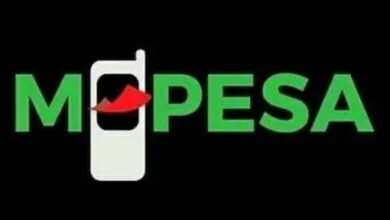Requirements And Cost Of Starting A Mitumba Business In Kenya

In this article, we will discuss everything you need to know about Mitumba business in Kenya, and also provide you with a comprehensive guide on how to start your venture.
Mitumba, which means “bundles” in Swahili, originated as a result of the global trade in used clothing. It gained momentum in Kenya during the 1980s, primarily driven by imports from developed countries. Over the years, the Mitumba industry has experienced remarkable growth, transforming into a vital component of Kenya’s informal economy.
The Mitumba market in Kenya operates through a complex web of suppliers, wholesalers, retailers, and consumers. Understanding the supply chain, market trends, and consumer preferences is an added advantage for entrepreneurs looking to enter this sector.
What Is Mitumba Business?
The Mitumba business involves the importation and sale of used clothing and accessories, mainly sourced from developed countries. It plays a vital role in Kenya’s retail industry, offering affordable clothing options to a wide range of consumers. The supply chain typically includes collectors, graders, wholesalers, and retailers.
How Profitable Is The Mitumba Business In Kenya?
The profitability of the Mitumba business in Kenya can vary based on factors like location, target market, competition, and operational efficiency. While profit margins can be substantial, success can be determined by factors like pricing, product quality, marketing efforts, and customer service. But all the same, a mitumba business is a very lucrative business in Kenya.
How Much Capital Do I Need To Start A Mitumba Business In Kenya?
The capital required to start a Mitumba business in Kenya is based on the scale of operations, rental costs, and initial inventory investment. A rough estimate suggests that a moderate-sized Mitumba business may require a starting capital ranging from Ksh 100,000 to Ksh 500,000, covering expenses such as rent, licenses, stock, shop fittings, and marketing.
What Are The Challenges Of Running A Mitumba Business In Kenya?
Running a Mitumba business in Kenya presents various challenges. These include competition from both formal and informal sectors, fluctuations in importation regulations, counterfeit items, sourcing reliable suppliers, managing stock quality and variety, high rental costs, theft, and the need for continuous marketing efforts to attract and retain customers.
Where Can I Get Mitumba Bales In Kenya?
Mitumba bales can be sourced from different locations in Kenya. Major cities like Nairobi, Mombasa, and Kisumu have dedicated Mitumba markets where wholesalers sell bales directly to retailers. Additionally, online platforms and social media groups provide opportunities to connect with reliable suppliers and explore a wider range of options.
What Type Of Clothing Sells Best In A Mitumba Business?
Certain clothing items tend to sell better in the Mitumba business due to their popularity and demand among Kenyan consumers. These include jeans, t-shirts, dresses, skirts, blouses, shirts, jackets, and children’s clothing. It is essential to monitor market trends and customer preferences to optimize product selection and maximize sales.
What Are The Best Locations To Start A Mitumba Business In Kenya?
The choice of location influences the success of a Mitumba business. Ideal locations often include busy marketplaces, city centers, or areas with high foot traffic. Popular places in Kenya for Mitumba businesses include Gikomba Market in Nairobi, Kongowea Market in Mombasa, and Kibuye Market in Kisumu. However, careful consideration of factors such as competition, rental costs, and target market demographics is very important in determining the best location.
How Can I Import Mitumba?
To import “mitumba” (second-hand clothing) into Kenya, follow these general steps:
- Research Import Regulations: Get to know the import regulations and requirements set by the Kenya Bureau of Standards (KEBS) and the Kenya Revenue Authority (KRA). Stay updated on any changes in policies or restrictions.
- Business Registration: Register your business with relevant authorities, such as the Registrar of Companies, and obtain the necessary licenses and permits required for importation.
- Identify Suppliers: Establish contacts with reputable suppliers of second-hand clothing in countries where you intend to import from. Attend trade shows, connect with industry networks, or search online directories to find reliable suppliers.
- Product Quality And Condition: Ensure that second-hand clothing meets quality standards set by KEBS. Inspect the items for any defects, damage, or cleanliness issues to avoid importing substandard or unusable goods.
- Shipping And Logistics: Arrange transportation and logistics for the importation process. Consider partnering with freight forwarders or shipping agents experienced in handling import operations in Kenya. They can assist with customs clearance, documentation, and transportation.
- Customs Procedures And Documentation: Prepare the necessary customs documentation, including a bill of lading, commercial invoice, packing list, and any additional certificates or permits required by authorities. Comply with KEBS’s labeling and packaging regulations.
- Paying Duties And Taxes: Calculate the applicable duties and taxes based on the customs valuation of the imported goods. Consult with KRA to determine the correct tariff classification and ensure you pay the required fees.
- Customs Clearance: Submit the required documentation to customs authorities and undergo the clearance process. Pay any outstanding duties, taxes, or inspection fees as required.
- Distribution And Sales: Once the goods are cleared by customs, arrange for distribution to your desired retail locations or customers. Advertise and market your Mitumba products effectively to attract customers.
Remember, it’s important to stay informed about any changes in import regulations and maintain compliance with the relevant authorities. And also to ensure a smooth importation process, you have to seek advice from customs brokers, freight forwarders, or trade consultants. This will also give you more knowledge of how the import works.
What Are The Advantages Of Mitumba Business?
Below are the advantages of the mitumba business in Kenya:
1. Affordability And Variety: Mitumba offers a cost-effective alternative for consumers, especially in low-income segments, who seek quality clothing and goods at affordable prices. The wide range of products available in Mitumba markets provides customers with extensive choices.
2. Entrepreneurial Opportunities And Employment Generation: The Mitumba sector in Kenya provides numerous entrepreneurial opportunities, allowing individuals to start their businesses with relatively low investment. Additionally, the industry generates employment opportunities at various levels, contributing to economic growth.
3. Environmental Sustainability: The Mitumba business plays a vital role in promoting environmental sustainability by extending the lifecycle of used goods. Reusing clothing reduces waste, conserves resources, and mitigates the environmental impact of fast fashion.
What Are The Disadvantages Of Mitumba Business In Kenya?
Below are some of the considered disadvantages of the mitumba business in Kenya:
1. Threat To Local Textile Industry: One of the significant concerns associated with the Mitumba business is its potential adverse impact on the local textile industry. Imported second-hand goods can undercut locally-produced products by offering lower prices, leading to decreased demand for locally manufactured textiles and a decline in domestic production.
2. Quality Control And Safety Concerns: While Mitumba goods often provide affordable options, maintaining quality control can be challenging. Some second-hand items may have wear and tear, stains, or defects that affect their usability. Additionally, concerns regarding safety standards and hygiene may arise, as it can be difficult to verify the condition of these goods before they reach the market.
3. Ethical Considerations: The Mitumba business raises ethical considerations, particularly in terms of labor practices and fair trade. Ensuring that the supply chain adheres to ethical standards, such as fair wages and safe working conditions, is essential to promote sustainable and responsible business practices.
How Can I Market My Mitumba Business In Kenya?
Effective marketing is essential for the success of your Mitumba business in Kenya. Here are some strategies to consider:
1. Social Media Marketing: Use popular social media platforms such as Facebook, Instagram, and Twitter to showcase your products, engage with customers, and run targeted advertising campaigns. Share attractive product images, offer promotions, and encourage customers to share their experiences to generate word-of-mouth referrals.
2. Online Marketplaces: Explore online marketplaces like Jumia, Kilimall, and Masoko to reach a wider customer base. Create an online store and optimize product listings with detailed descriptions and high-quality images. Offer competitive pricing, provide excellent customer service, and encourage customer reviews and ratings.
3. Collaborations And Influencer Marketing: Partner with local influencers, fashion bloggers, or stylists who have a significant following on social media. Collaborate on content creation, outfit styling, or reviews to leverage their influence and reach a larger audience. Offer discounts or free products in exchange for promotion.
4. Traditional Advertising: Consider traditional advertising channels such as radio, newspapers, and billboards, particularly in areas where your target market is concentrated. Develop compelling ad campaigns that highlight the affordability, quality, and trendy nature of your Mitumba products.
5. Customer Loyalty Programs: Offer discounts, exclusive deals, or rewards for referrals to encourage customers to become brand advocates.
6. Visual Merchandising: Pay attention to the visual presentation of your store. Display merchandise in an organized and appealing manner, utilize eye-catching signage and create attractive window displays to entice passersby and draw them into your store.
7. Engage With The Community: Participate in local community events, sponsor fashion shows, or collaborate with other businesses to increase visibility and build relationships within the community. This involvement can create positive associations with your brand and help establish trust and credibility.
Summary Of How To Start A Mitumba Business In Kenya
By following these steps you can start a mitumba business:
1. Conducting Market Research: Thorough market research is essential to identify potential niches, assess competition, and understand consumer demand. Conduct surveys, visit local markets, and gather data to gain insights into your target market.
2. Legal And Licensing Requirements: Complying with legal and licensing regulations is vital for any business. Obtain the necessary permits, register your business, and ensure adherence to relevant laws and regulations governing the Mitumba trade.
3. Sourcing Mitumba Merchandise: Establishing a reliable supply chain is crucial for the success of your Mitumba business. Explore different sourcing options, such as auctions, wholesalers, or even direct importation, and build relationships with trusted suppliers.
4. Setting Up Shop: Choose an appropriate location for your business, keeping in mind factors like foot traffic, accessibility, and rental costs. Create an inviting and organized space for your customers, showcasing your Mitumba products effectively.
5. Pricing And Profitability: Determining the right pricing strategy is crucial to ensure profitability. Consider factors such as product quality, market demand, and competition when setting your prices.
6. Marketing And Promotion: Develop a robust marketing strategy to create awareness and attract customers to your Mitumba business. Utilize both traditional and digital marketing channels, such as social media platforms and local advertising, to reach your target audience effectively.












